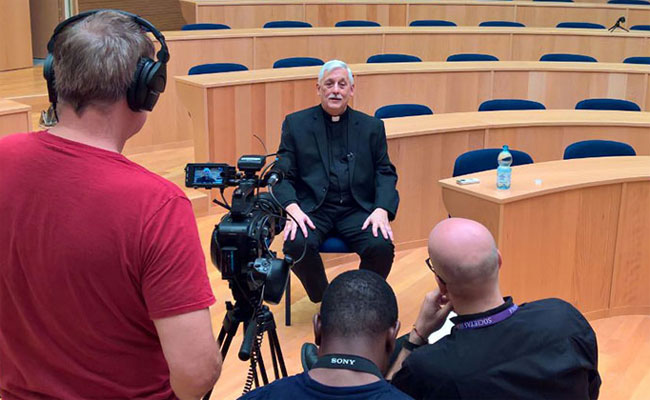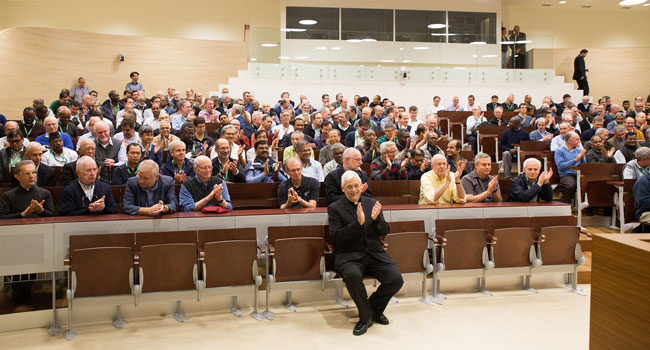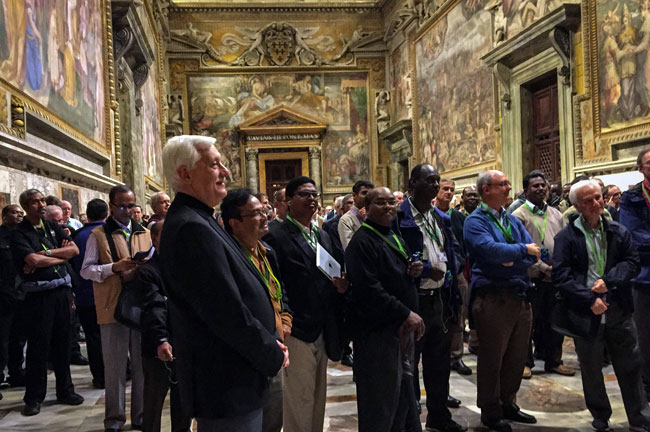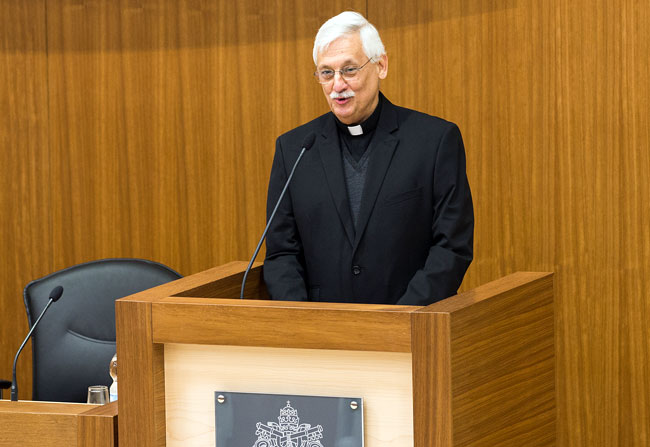November 3, 2016 — In his first in-depth interview after being elected superior general of the Society of Jesus, Venezuelan Jesuit Father Arturo Sosa was quick to point out that he didn’t arrive at the Jesuits’ General Congregation 36 in Rome with an expectation that he would be the man selected for the job.
But Fr. Sosa had a feeling something was brewing when, after four days of murmuratio — one-on-one conversations and information gathering leading up to the election — the delegates to the Congregation began asking him about his health.
“As I saw the votes on the date of the election, things became clearer to me, and I had the profound intuition that in this case I have to trust the judgment of the brothers because I don’t trust my own. If they elected me, there was a reason, and I would try to respond the best that I can.”
The first Latin American elected superior general, Fr. Sosa was born in 1948, “during the very scant period of democracy” in Venezuela in the first half of the 20th century. Raised in a Catholic family that valued academics, he was encouraged to “to open up to the world, to study languages.” His father was a lawyer/economist who took his son on business trips. They’d arrive in a new city and ride the trolley so young Arturo could open his eyes to “an ever-greater reality so that I would not remain enclosed in what I already knew.”

Fr. Sosa giving his first interview as superior general.
He was greatly influenced by the Jesuits at Colegio San Ignacio in Caracas, which was his second home from the age of 5 to 18. It was here that he experienced the “great meaning that life has when you give yourself to others.”
Fr. Arturo Sosa’s Jesuit Journey
Fr. Sosa says he never had any doubts about a vocation to the Society of Jesus. “I never even thought of it in terms of priesthood but just wanted to be a Jesuit.” He recalls wanting to do something to help his country, and the best place to do that, he thought, was the Society of Jesus. His vocation was also influenced by Vatican II and the election of Father Pedro Arrupe as the Jesuits' 28th superior general, “another breath of fresh air.”
As part of his Jesuit formation, Fr. Sosa, unlike many of his fellow scholastics who were sent to work in Jesuit schools, was missioned to Centro Gumilla of Barquisimeto, a social action center that worked primarily with small farm cooperatives.

Fr. Sosa (second from left) as a Jesuit novice.
For theology studies, he was sent to Rome, and while he wanted to stay in Latin America because the region was alive with “dynamic religious and political movements,” he was thankful to have an experience of living together with Jesuits from 30 different countries. For his final year of theology studies, he attended the Universidad Central de Venezuela and also worked in a Jesuit parish in a poor neighborhood of Caracas.
The next two decades were busy ones for the young Jesuit. He earned a doctorate, taught undergraduate students and wound up ultimately running the journal for Centro Gumilla, where he tried to shine a spotlight on Venezuela’s social reality.

Fr. Sosa and GC 36 delegates visited the Gregorian University in Rome.
In 1996, he was appointed provincial, a time he recalls “when it was clear that there were going to be strong social changes … those years were very intense.” He quickly learned that the apostolic mission “does not belong to us” but to the many collaborators who carry it out “at the same time that they are raising a family in very trying circumstances.” As the rector of the Universidad de Frontera in Tachira, 600 miles from Caracas near the border with Colombia, Fr. Sosa worked on an apostolic project that brought people together on both sides of the border. He also helped organize Jesuit universities in Latin America into an effective network to fight poverty and promote youth leadership. Fe y Alegría, which offers educational opportunities for the poor in 21 countries, was always a priority, and he calls the growth of the network a “joyful experience.”
At only 34, he was elected as a delegate to the Jesuits’ General Congregation 33, the youngest delegate of that congregation; he also took part in GC 34 and GC 35. During GC 35, Fr. Sosa was named by his predecessor, Father Adolfo Nicolás, SJ, to a leadership role, helping to advise on matters related to the governance of the Society.

Fr. Sosa and GC 36 delegates toured the Sistine Chapel.
And then, two years ago, he was asked to serve as the Delegate for the Jesuits’ Roman Houses. “Being a student at the Gregorian at age 28 was very different from coming here at age 60-something and being responsible for 400 Jesuits who work in the international houses,” he says.
Looking to the Future
“People ask me what I am like, and I always respond that I am tranquil. I am convinced that there is no Society if it is not ‘of Jesus’ … if the person of Jesus Christ is not before us, within us, and with us every day, then the Society has no reason to exist,” says Fr. Sosa.
While he hasn’t speculated about how he might lead the Society, Fr. Sosa is quick to champion the need for collaboration, saying, “The Society of Jesus makes no sense without the collaboration of others … in many places we are still nostalgic about the days when we could do everything.”

Fr. Sosa speaks three languages and is passionate about the need for multiculturalism because “the true face of God is multicultural, multicolored and multifaceted. … If the Society succeeds in reflecting this diversity, it will become an expression of that fascinating face of God.
“My impression is that the Society is very much alive … God is at work. The key thing is to help, not get in the way.”
To read the full interview with Fr. Sosa, click here.
Do you want to learn more about vocations to the Society of Jesus? Visit www.jesuitvocations.org for more information.